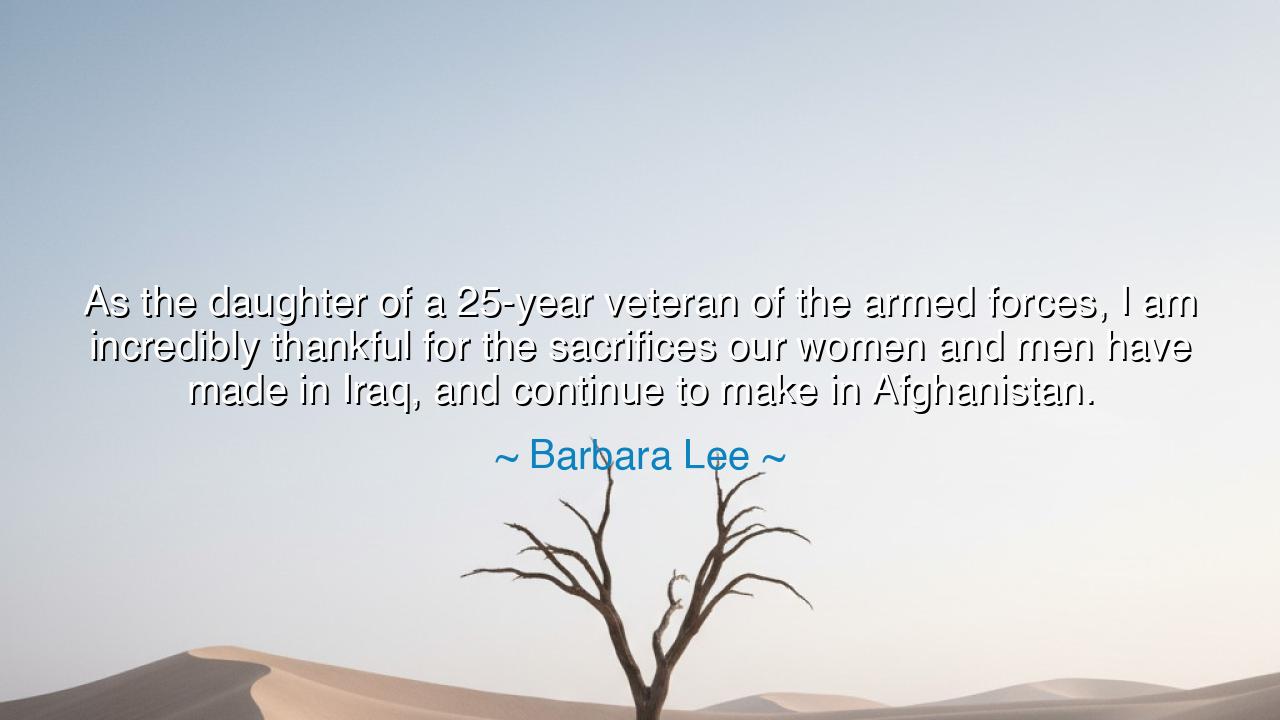
As the daughter of a 25-year veteran of the armed forces, I am
As the daughter of a 25-year veteran of the armed forces, I am incredibly thankful for the sacrifices our women and men have made in Iraq, and continue to make in Afghanistan.






Barbara Lee once spoke with solemn reverence: “As the daughter of a 25-year veteran of the armed forces, I am incredibly thankful for the sacrifices our women and men have made in Iraq, and continue to make in Afghanistan.” In these words resounds not only the voice of a daughter, but the voice of a nation remembering its guardians. Her gratitude is deeply personal—rooted in the life of her father who served a quarter of a century in uniform—yet it is also universal, reaching outward to embrace all who have borne the heavy burden of war.
To call oneself the daughter of a veteran is to speak of inheritance, not of wealth, but of duty, endurance, and service. Lee’s father embodied a soldier’s life, one defined by sacrifice and discipline. That legacy shapes her words, as she extends her family’s story into the broader story of countless others who have stood in deserts and mountains, far from home, so that others may live in safety. The thankfulness she expresses is not empty courtesy, but the recognition that such sacrifices are measured not in hours, but in wounds, in separation, in the silent scars carried long after the battlefield.
The ancients knew that warriors bore the weight of nations upon their shoulders. In Greece, the poet Tyrtaeus sang of those who fell in defense of their homeland, calling them immortal in memory. In Rome, the legions who marched to distant lands were honored with triumphs, for their toil preserved the life of the Republic. So too in Lee’s words, Iraq and Afghanistan stand as the modern fields where sacrifice has been poured out. Her gratitude binds the ancient pattern of valor to the present, recognizing that the warrior’s burden remains unchanged across the ages.
Consider the story of the famed 54th Massachusetts Regiment during the American Civil War. Comprised largely of African American soldiers, they marched into battle at Fort Wagner, many never to return. Their bravery challenged the prejudices of their time and proved that freedom was worth every drop of courage. Like those soldiers, the women and men whom Lee honors gave themselves wholly, knowing that safety and liberty are fragile things, preserved only by those willing to risk everything. Gratitude, then, is not mere sentiment, but an eternal debt owed to the fallen and the living alike.
At the heart of her words is the power of sacrifice. To serve in war is not only to face the enemy but to leave behind family, to endure distance, uncertainty, and the possibility of death. It is to live each day as though it may be one’s last, so that others may wake in peace. That Lee, a daughter of a soldier, speaks of thankfulness is a reminder that such sacrifices ripple across generations, shaping children, families, and entire communities.
The lesson is clear: we must not forget those who bear the weight of service. Gratitude must not end in words but must live in actions—caring for veterans, supporting their families, and ensuring that their sacrifices are honored with justice and dignity. To be thankful is to act, to create a society that remembers its defenders not only on days of celebration, but in the quiet work of providing healing, opportunity, and respect.
In our own lives, this means pausing to recognize the unseen battles around us—not only on foreign soil but within the hearts of those who return. It means teaching the young to honor sacrifice, not with empty slogans, but with real remembrance and service. Support organizations that aid veterans, listen to their stories, and extend compassion to their families. In doing so, we, too, become heirs of the covenant of gratitude that Barbara Lee proclaims.
Thus, let her words be remembered: the sacrifices of those who serve are not their burden alone, but our inheritance to honor. And to be thankful is not weakness, but strength—the strength of a people who know that freedom is costly, and who vow never to let those costs be forgotten.






AAdministratorAdministrator
Welcome, honored guests. Please leave a comment, we will respond soon